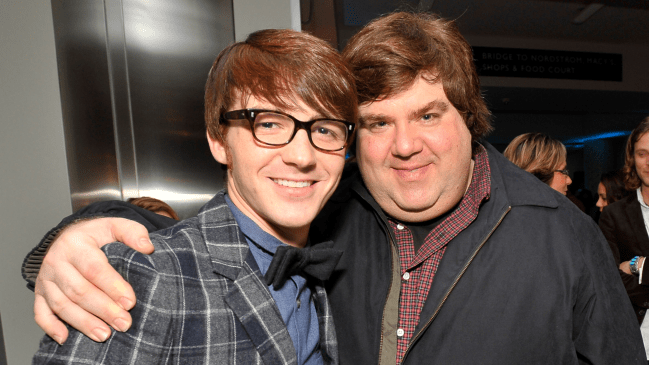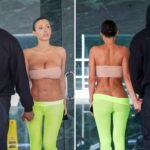There isn’t an ideal place for the public to discuss child abuse allegations, but for now, TikTok might be our best option. That’s a precarious position for young entertainers and their advocates to be in as the U.S. government once again moves to ban the social media platform.
On Sunday, March 17, ID Network’s “Quiet on Set: The Dark Side of Kids TV” began its deep dive into the toxic workplace allegations and child abuse reports that emerged out of Nickelodeon following Dan Schneider’s ousting in 2018. Within hours of the docuseries’ premiere, dozens of press outlets and at-home viewers started posting TikTok supercuts of the most damning moments from the first two episodes.
Tagging “Quiet on Set,” Stephanie Matto from “90 Day Fiancé” even made a video discussing her personal experiences with Schneider and the competitive nature of TV parents at Nickelodeon from when she was a young actress. “I’m really curious to see what other cast members step forward and have things to say about Dan Schneider,” the former reality star said. “This is just absolutely crazy.”
Matto is the latest in a long line of kid actors who appeared on Disney Channel and/or Nickelodeon in the ’90s, aughts, and early 2010s and are now using social media to reflect on their time in Hollywood. Schneider became a frequent subject of discussion — and derision — on TikTok way before this four-part indictment for the ID Network, which effectively formalizes a story that mostly broke on social media.
Set to debut over two nights, ID’s true crime title unpacks the widespread mistreatment of child actors that was happening at Nickelodeon when Schenider’s TV empire was at its most formidable. In an email to IndieWire, representatives for Schneider said the former showrunner’s camp had not seen “Quiet on Set” before it aired and only answered questions about it from producers via email. Schneider’s team described that situation as “unfair” and further claimed advocates for the former Nickelodeon big shot had been wrongly denied the opportunity to be interviewed for inclusion in the doc.
Schneider maintains his innocence via written statements slated throughout “Quiet on Set” and has never been accused of physically or sexually abusing children himself. But the ex-TV exec is also sorely wanting for defenders in arenas like TikTok, where the public’s debate about his character is all but bring-in-the-dancing-lobsters settled. The “Amanda Show” creator has been accused of creating a toxic and dangerous work environment that allowed for child actors to be exploited.
“Quiet on Set” pays particular attention to the conservatorship of Amanda Bynes, the dangerous culture that festered behind the scenes of “All That,” and the complex personal history of Drake Bell.
In Episode 3, “The Darkest Secret,” Bell speaks out for the first time about the physical, psychological, and sexual abuse he endured at the hands of his dialogue coach Brian Peck (who has no relation to Bell’s “Drake & Josh” co-star Josh Peck). Peck, who was also an actor and producer on “All That,” was convicted of sexually abusing Bell in a legal case from 2004; the teen actor’s name was protected during those proceedings, although he was one of many potential victims speculated about at the time.
In 2023, the actor pleaded guilty to felony endangerment for sending lewd texts to a minor. That incident is mentioned only briefly in the documentary but remains of significant interest to those who will consider Bell’s story on TikTok.

Ahead of the series’ debut, Vanity Fair and other publications credited ID with shedding new light on the horror stories that quietly underpin millennial favorites like “iCarly,” “Zoey 101,” and “Victorious.” But the throwback fandom community online has been doing that work for years. Since the pandemic, TikTok has played an increasingly large role in the cultural reassessment of working conditions for kid actors. That makes sense considering it’s coming up shortly after #FreeBritney saw the music industry reckon with the abuse of Britney Spears. The demographic that grew up on these shows continues to get most of its information from social media.
Even with non-disclosure agreements at play, TikTok has given aged-out child stars a commanding platform to acknowledge their sometimes-harrowing beginnings in entertainment. The video format allows audiences who might not know these actors by name to instead recognize their faces and hear about their experiences directly. These TikTok testimonials are typically given without the intervention of a producer, and instead seem to be made first and foremost with the talent’s well-being and comfort level in mind.
“Even Stevens” star Christy Carlson Romano broke significant ground with “The Vulnerable Podcast” when clips of the host recounting her negative experiences at the Disney Channel went viral. She soon began inviting entertainers with similar experiences to join her; that includes “Zoey 101” co-star Alexa Nikolas, who talked about the intense toll the Schneider-helmed production took on her health with Romano and who also appeared as an interview subject for “Quiet on Set.” (Notably, when Nikolas disagreed with the edit given to her conversation with Romano, she reframed the interview in a separate video posted to her YouTube channel, which caused its own controversy.)
Anneliese van der Pol, who co-hosts the podcast “Big Name Bitches” with Romano, has used TikTok to cheekily joke about the legal agreements keeping her from sharing some of what happened to her on the set of “That’s So Raven.” She’ll frequently use trending sounds to wink at her negative history with Disney, avoiding too many specifics while making it clear that her time spent on the series and its reboot wasn’t great. In a post from February 2024, the actor wrote, “Me embracing the Disney-actor-turned-TikToker pipeline,” over a lipsync video with the audio, “I would check myself into a mental hospital today, but I’ve got stuff to do.” Alyson Stoner, who appeared on “The Suite Life of Zack & Cody” and in the Disney Channel original movie “Camp Rock,” has similarly established themselves as an activist fighting for better working conditions for kids across Hollywood and social media.
“iCarly” and “Sam & Cat” star Jennette McCurdy’s memoir from 2022, titled “I’m Glad My Mom Died,” is uniquely important to our understanding of kid stardom — in no small part because McCurdy refused to sign an NDA when exiting Nickelodeon and actually broke the seal on much of what appears in “Quiet on Set.” That said, plenty of people experienced the revelations from McCurdy’s book not by reading it, but by stumbling across audio excerpts McCurdy produced to promote her story in spaces like TikTok.

Still, the controversial platform continues to hang in the legal balance in the U.S. On March 13, the House of Representatives passed a bill that, if forwarded by the Senate and President Biden, would force TikTok’s Chinese parent company, ByteDance, to sell the app or see it removed from American phones. That could prove a problem for the discussion around kid actors. Imperfect though it may be, the platform offers fertile ground for raising awareness about the workplace abuses suffered by a niche group in Hollywood; TikTok recycles intimate conversations from press interviews and actors’ solo media endeavors into bite-sized exposés that achieve significant reach and seem to actually make an impact.
It’s worth noting that podcasts — including rewatch podcasts — have played a sizable role in fostering these conversations; McCurdy even made a podcast to accompany her book. But those accounts are fractured across various audio platforms, and their most powerful reception seems to occur not through comments on Spotify or Apple Podcasts but on unifying social platforms. On TikTok, you’ve also got the voices of the unscripted contingent comprised of former “Dance Moms” cast members and internet celebrities who grew up on YouTube and Vine. That group is simultaneously criticizing how they were treated by the content machine, with some even challenging state legislators to better protect underage influencers going forward.
Not for nothing, but “Quiet on Set” marks a massive step in illuminating what actually happened at Nickelodeon when the channel and Schneider were at their peak. (The docuseries repeatedly informs viewers that Paramount Media Network has since implemented better safeguards to protect young talent.) But the practically inevitable recirculation of the series’ most powerful clips seems almost more important than watching the complete finished product in the modern landscape.
Throughout “Quiet on Set,” we see archival snippets from Nickelodeon TV shows that are, at best, questionable: comedy sketch compilations that are disturbing because they sexualize young girls, hinge on racist stereotypes, or seem to recklessly misuse their child actors. Those exact scenes have made the rounds on social media for months, maybe even years before now. The implication that suddenly re-broadcasting them on TV makes their underlying indictment more credible is misguided at best, ironic at worst. And if you find yourself really interested in what the show has to say, there’s no question any digital investigation will lead you back to TikTok.
“Quiet on Set: The Dark Side of Kids TV” is a four-episode docuseries set to premiere in two parts; episodes air Sunday, March 17 and Monday, March 18 at 9 p.m. ET and stream next day on Max.








